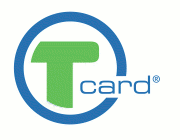Tcard
 Sydney's public transport ticketing system |
||
| Release: | Cancelled | |
| Prior system: | Automated fare collection system (Sydney) | |
| Issuing Authority: | Public Transport Ticketing Corporation | |
| Technology: | MIFARE contactless smart card | |
Public transport ticketing in New South Wales, Australia operated using magnetic-stripe technology between 1989 and 2016. This ticketing system, known variously as the Automated fare collection system, STATS and, from 2010, MyZone, was progressively replaced by a contactless smart card called Opal between 2012 and 2016.
From the 1950s until the 1990s, single bus tickets were printed in blocks of 250 and stapled together. These tear-off tickets, known as 'flimseys', were initially issued by conductors. Conductors were progressively withdrawn, with drivers issuing tickets from the early 1980s onwards. State Transit withdrew flimseys in 1992.
The first multi-modal periodical tickets, called TravelPass, went on sale in September 1983 under the Wran State Government. Initially TravelPass was a flash pass system.
Magnetic-stripe tickets were first used in Sydney on the Eastern Suburbs Railway line, from its opening on 23 June 1979. Integrated bus-rail tickets were also available for this line.
An automated multi-ride ticket system called MetroTen, based on optical mark recognition rather than magnetic stripe technology, was used on Sydney's government buses from 1985 until 1992. In general, however, many Sydney commuters used paper tickets specific to the mode of transport on which they were purchased until the mid-1980s.
The early systems, along with the simple paper tickets used on the rail network, made policing fare compliance somewhat labour-intensive. Originally the railways had ticket collectors or inspectors at the exit of every station. Bus services had drivers, and previously conductors, selling or checking periodical tickets. The cost-saving reduction of ticketing staff on state public transport resulted in the responsibility for fare compliance being transferred from the service operators onto the passengers. This change sometimes resulted in revenue loss. For example, Urban Transit's MetroTen was easily and frequently defrauded by passengers. Of the "el cheapo Metroten ticketing system that the former Labor Government installed", transport minister Bruce Baird told Parliament, "Many people know that rorting has gone on. ... The system is outdated and has outlived its usefulness."
...
Wikipedia
